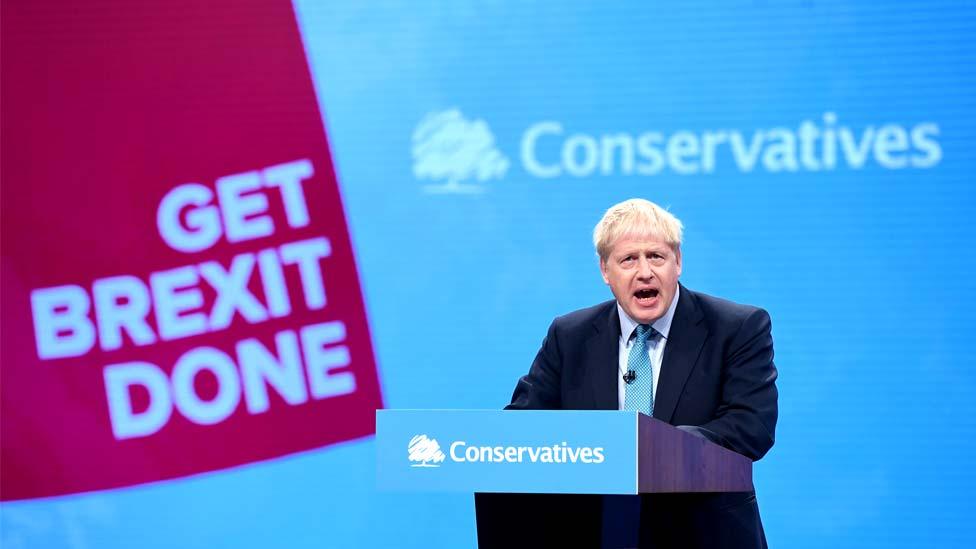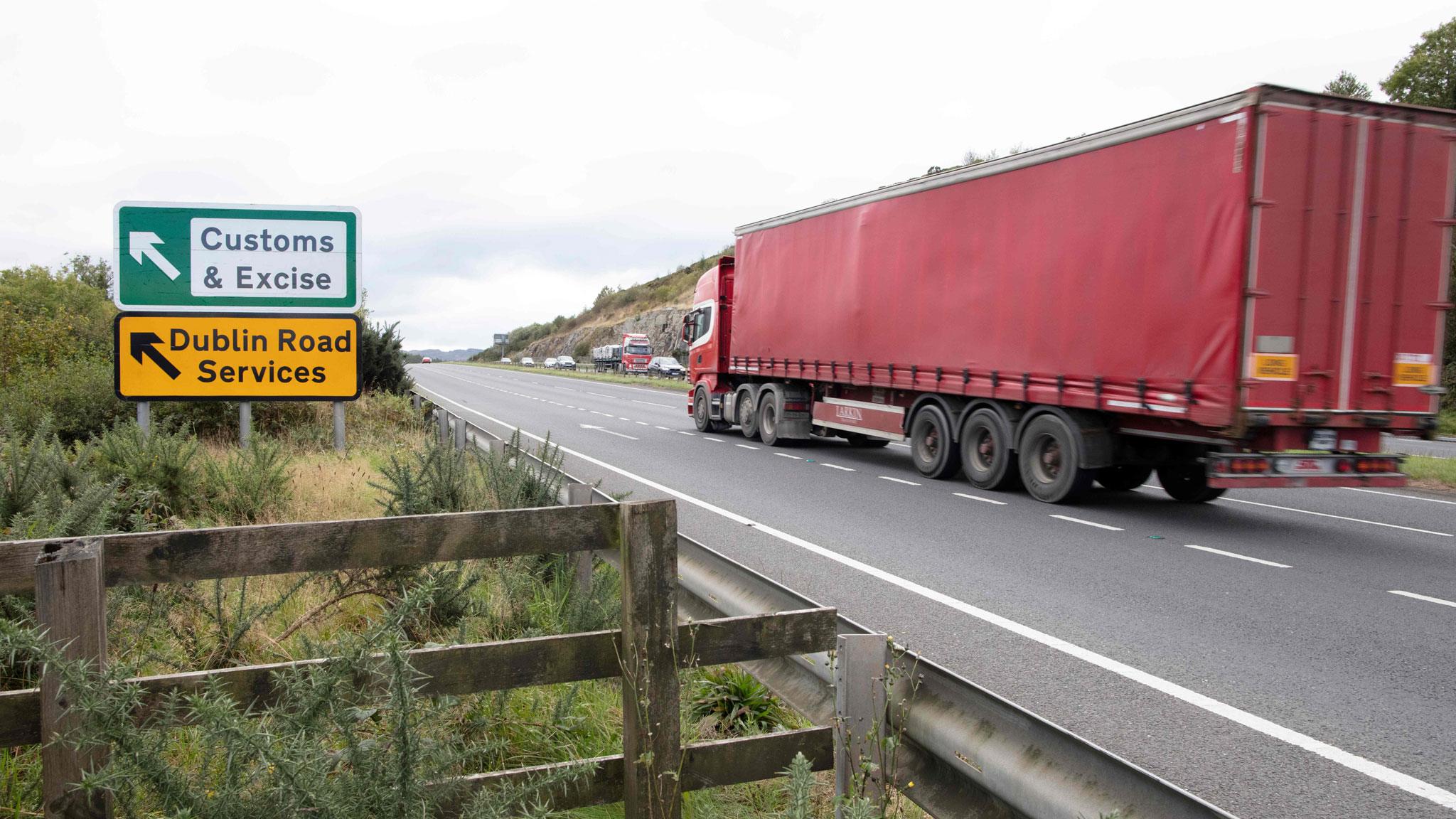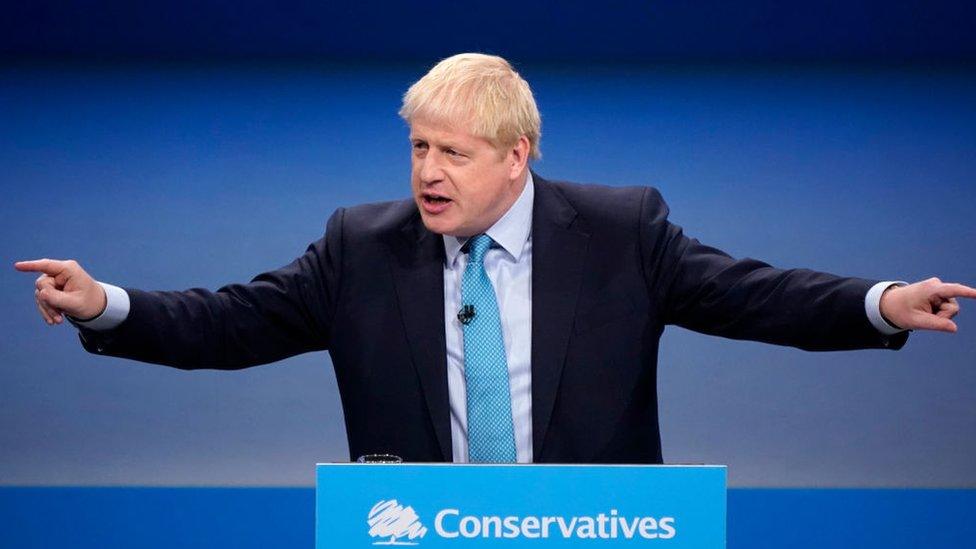Brexit: Boris Johnson sets out deal to MPs
- Published
- comments
Brexit: Reaction to Boris Johnson's Irish border proposals
Boris Johnson is setting out his proposals for a Brexit deal in Parliament, while EU leaders also consider their response.
He outlined plans on Wednesday that would see Northern Ireland stay in the European single market for goods but leave the customs union - resulting in new customs checks.
The European Commission welcomed "advances" but said problems remained.
The PM says the UK will leave the EU on 31 October, with or without a deal.
He insists he will not ask for a further extension if no deal is reached despite legislation designed to force him to do so unless MPs pass a deal or approve a no-deal Brexit before 19 October.
Irish Prime Minister Leo Varadkar, whose stance is expected to guide how the EU responds, said the UK's approach "did not fully meet the agreed objectives of the backstop". The backstop is a mechanism designed to avoid a hard border on the island of Ireland after Brexit.
However, he did add he would study the proposals "in further detail".
European Commission President Jean-Claude Juncker will speak to Mr Varadkar later, the commission has said.
The UK government hopes to begin a period of intense negotiations with the aim of reaching a final agreement at an EU summit on 17 October.
Brexit Secretary Stephen Barclay told BBC Breakfast that the government's plan set out to the EU were "serious proposals" and were recognised by EU chief negotiator Michel Barnier as such.
He said both sides "recognise that it is better to have a deal" and negotiations "will have to be intensively done in the next few days".
There will be further talks on Friday "subject to how today unfolds", Mr Barclay said.


Many EU leaders feared, before they saw it, that the plan would show the prime minister was focused on a domestic audience, on an upcoming general election and not engaging with the EU.
But I have spoken to a number of EU diplomats tonight who say some of the proposals were better than expected.
But they emphasised very big differences remain between the two sides.
The EU has a number of concerns when it comes to the prime minister's offer.
And the European Commission says before it can think of compromise it has a number of detailed questions for the government, when it has properly digested the paper.
The main concern for the EU, the big flashing lights, come down to customs.
It fears the prime minister's offer could pose a threat to the Northern Ireland peace process and leave the single market exposed after Brexit. Those are two big no-nos for the EU.
Looking forward, they have to come to agreement and unanimity among themselves
Any idea in the UK that EU leaders will turn to Ireland and say "you need to compromise because we want a deal with the UK" is not one we are hearing behind the scenes or in public.

What is in the plan?
The PM's Brexit plan set out details of a replacement for the Irish border "backstop" in the current Brexit agreement.
The backstop is the controversial "insurance policy" that is meant to keep a free-flowing border on the island of Ireland but which critics - including the PM - fear could trap the UK in EU trading rules indefinitely.
Under Mr Johnson's proposals, which he calls a "broad landing zone" for a new deal with the EU:
Northern Ireland would leave the EU's customs union alongside the rest of the UK, at the start of 2021
But Northern Ireland would, with the consent of politicians in the Northern Ireland Assembly, continue to apply EU legislation relating to agricultural and other products - what he calls an "all-island regulatory zone"
This arrangement could, in theory, continue indefinitely, but the consent of Northern Ireland's politicians would have to be sought every four years
Customs checks on goods traded between the UK and EU would be "decentralised", with paperwork submitted electronically and only a "very small number" of physical checks
These checks should take place away from the border itself, at business premises or at "other points in the supply chain"
The government is also promising a "New Deal for Northern Ireland", with financial commitments to help manage the changes.
How have politicians reacted?
The Democratic Unionist Party - whose votes the government is likely to need to pass the deal - have supported the plan saying it would allow Northern Ireland to leave the customs union and single market at the same time as the rest of the UK.
The party's Westminster leader Nigel Dodds told BBC Breakfast that the proposals "remove the trap" of the backstop and he said they were "a massive improvement".
However, other Northern Ireland parties criticised the proposals.
Sinn Fein called the plans a "non-starter", the Social Democratic and Labour Party said they were "dead on arrival", and the Ulster Unionist Party argued Northern Ireland would be left in a "perpetual cycle of uncertainty".
Irish Minister for European Affairs Helen McEntee said there were "concerns" and "obvious challenges" with the plan.
"I've always said there are grounds for a deal but there are key objectives we need to meet: protecting the Good Friday Agreement, and to prevent border infrastructure, protecting the economy and the single market," she said.
DUP leader says new proposals "sensible and serious"
Several Conservative MPs who rejected Theresa May's withdrawal agreement signalled their support. Leading Brexiteer Steve Baker said it was "highly likely" the deal would get through Parliament.
And fellow Brexiteer Bernard Jenkin told BBC Radio 4's Today programme there was "a mood for compromise" and "very strong grounds for optimism" as "people want to get this done".
But Labour leader Jeremy Corbyn said the deal was "not acceptable" and the Lib Dem's Jo Swinson accused Mr Johnson of not being "serious about getting a deal".
Labour MP Hilary Benn, chairman of the Commons Brexit Committee called the proposals "worse than Theresa May's", saying: "How will it help peace and stability in Northern Ireland if every four years there is a divisive debate about whether to follow UK or EU rules?"
Scotland's First Minister and SNP leader Nicola Sturgeon said the proposals were "designed to fail".
If the EU and UK cannot agree a deal which is approved by MPs by 19 October, the prime minister is compelled by the Benn Act to seek an extension to the Brexit negotiation process unless the Commons votes to leave without a deal.
However, the prime minister has repeatedly insisted the UK will leave the EU on 31 October with or without a deal, and that he will not ask for an extension.
- Published2 October 2019

- Published2 October 2019

- Published2 October 2019

- Published2 October 2019
